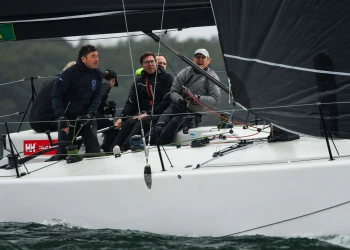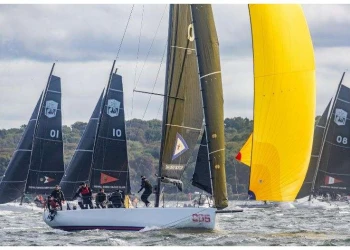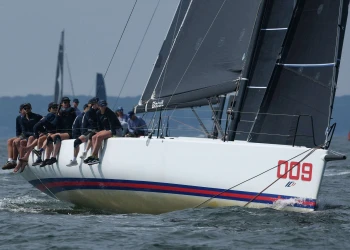
2025 Team Racing World Championship
Where: Racing in the 2025 Team Racing World Championship will take place on Narragansett Bay, Rhode Island, most likely between Rose Island and Goat Island. All onshore events will take place at the New York Yacht Club Harbour Court in Newport, R.I.
When: Registration and practice racing will take place on Wednesday, May 28, with racing scheduled each day for Thursday, May 29, through Sunday, June 1. The first race will start around 10 am each morning, weather depending, and run into the late afternoon.
Who: Twelve teams from 10 countries will compete, including Argentina, the Bahamas, Bermuda, Great Britain, Greece, Ireland, Italy, New Zealand, Sweden and the United States. Each team consists of between six and eight sailors; a minimum of two women and two men are required on each team.
Why: At stake is World Sailing's Team Racing World Championship title. This title was first awarded in 1995 in Miami, Fla., and was competed for on a roughly biennial basis until 2015. The event has been dormant for a decade.
What: Team racing is a niche of the sport that pits against each other two teams sailing two to four boats of the same class. The winning team is decided by combining the results of each team's boats. Superior boathandling, quick thinking and a strong understanding of the rules are required for success. In scholastic and collegiate competition in the United States, the preferred format is 3-on-3 using lightweight two-person dinghies. This was also the format for each of the previous world championships. The 2025 Team Racing World Championship will be sailed 2-on-2 using 23-foot Sonar keelboats. The 2-on-2 format has won fans due in part to its simplicity. The team of the last boat to cross the finish line in any race loses that race.
Storylines:
The rebirth of the team racing worlds. While not as prevalent as fleet racing or as storied as match racing, team racing has a passionate group of devotees who love the frenetic action, the camaraderie and the Corinthian nature of the competition. Having an active world championship validates their collective passion for this niche of the sport.
New format broadens appeal. When the world championship was contested in lightweight two-person dinghies, weight was a limiting factor as bigger sailors were at an immediate disadvantage, especially in lighter air. The Sonar, with between 3 and 5 people sailing on each boat, is more forgiving and opens the world championship to a much larger group of sailors. Additionally, the 2v2 format is easier to understand for spectators. Only last place matters.
Youth versus experience: The change to Sonars has widened the age range of the competitors. Will the experience of former world champions now into their 40s be able to top the enthusiasm and talent of the younger generation?
Former world champions hoping to return to the top of the podium. Tim Wadlow, of the Corinthian Yacht Club team from Marblehead, Mass., won the team racing world championship in 2005—the last time it was held in the United States. The two skippers for the New York Yacht Club, Clay Bischoff and Peter Levesque, won a pair of world titles in 2007 and 2009. Finally, four of the eight sailors for Great Britain's West Kirby Hawks were part of a world-championship-winning team in 2011. Whichever of these teams best adapts to the new format and boats stands a very strong chance of winning again.
New countries catching the team racing bug: For many years, team racing was dominated by teams from the United States and Great Britain. Together those two countries won eight of the 10 previous world crowns. But other countries are getting in on the action, from the Bahamas to Bermuda to Greece. How will they fare against countries with an established culture of team racing?
Will the prohibition against spinnakers translate into enhanced aggression on the racecourse? Keelboat team racing at the New York Yacht Club has traditionally featured spinnakers for the downwind legs. But to keep the playing field as level a possible, no spinnakers will be used in the world championship.





